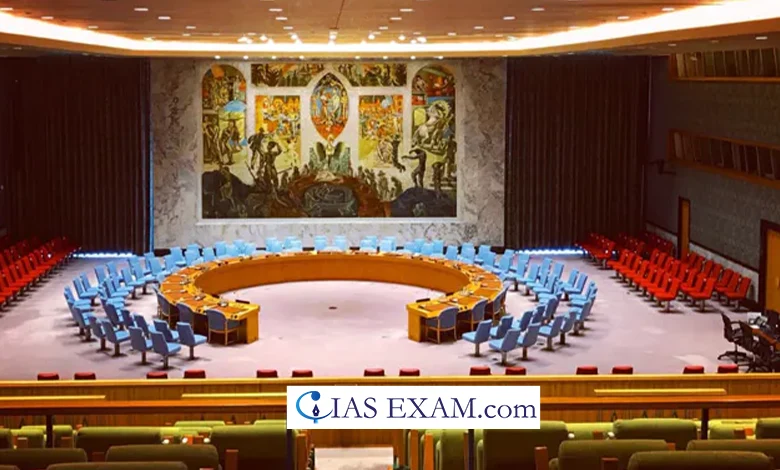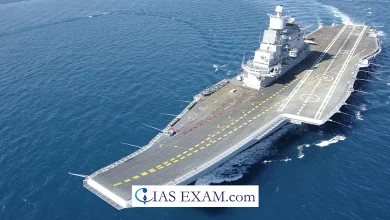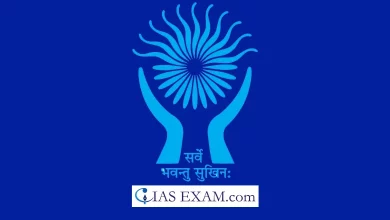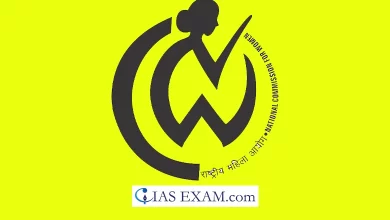Daily Current Affairs for UPSC
India’s demand for reform of the UN Security Council
Syllabus - International Organization [GS Paper-2]

Context
India has recently reiterated its stance on the urgent need for genuine reform of the UN Security Council.
About
- During the sixth round of the intergovernmental negotiations of UNSC, India favoured expansion of the UN Security Council in both the permanent and non permanent categories.
- Total of 113 member states out of 122 supported expansion in both of the existing categories specified in the charter.
- This approach showed that more than 90 percent were in favour of expansion in both categories of membership specified in the charter.
About the UNSC
- The United Nations Security Council (UNSC) is one of the important organs of the United Nations, answerable for retaining international peace and security.
- It was established in 1945 as part of the UN Charter and is composed of 15 member states, including 5 everlasting members with veto power—China, France, Russia, the UK, and the US—and ten non-everlasting participants elected for 2-year phrases by the General Assembly.
- It is centered in New York City.
Need for the Reforms in the UNSC
- Under-Representation: The modern composition of the Security Council has under-representation and un-representation of key regions.
- It fails to represent the diversity of today’s world, with emerging powers like India, Brazil, and South Africa, in addition to regions like Africa, being underrepresented or not represented in any respect.
- Inability to Address Conflicts: The contemporary composition of the council has an inability to deal with important conflicts and maintain international peace and security.
- Changes in World Order: The world has undergone a sea change since 1945 and the new realities need to be pondered in the permanent membership.
- Any proposal that does not deal with the difficulty of representation of the Global South, consisting of Africa, Asia and Latin America, in the everlasting category does a grave injustice to the aspirations of developing countries for equality.
- Veto Power: Currently, only the 5 permanent members preserve veto powers and through its use have stalled action in the Council to cope with worldwide challenges and conflicts which include in Ukraine and Gaza.
- The last 10 countries in the Council are elected to sit down as non-permanent participants for two-year terms and do not have veto powers.
- Legitimacy: The disproportionate power held by the five permanent members, in particular their veto power, can result in a perception of unfairness and absence of legitimacy.
- Transparency and Accountability: Critics argue that the USA operates with a loss of transparency and accountability, with selections regularly made in the back of closed doorways and without enough consultation with other UN member states.
Limitations in Introducing the Reforms in UNSC
- Veto Power of Permanent Members: Any reforms to the composition or working methods of the UNSC require the approval of the five permanent members.
- These countries have divergent interests and are reluctant to support changes that might diminish their impact in the Council.
- Regional Dynamics: Regional rivalries and geopolitical tensions complicate efforts to reform the Council.
- Complexity of the Reform Process: Amending the UN Charter to enact reforms requires a prolonged and complex technique concerning ratification via a widespread range of member states, making it tough to enact substantive reforms.
- Chinese Opposition: China being a permanent member blocks thegrowth of India becoming a Permanent Member.
Way Ahead
- It is essential that both the permanent and non-permanent membership be representative of the world as it is these days, not the world because it existed in the wake of the Second World War.
- Reforms within the UNSC are vital for keeping its relevance, legitimacy, and effectiveness in addressing the complicated security challenges faced by the global community.
- However, accomplishing consensus on such reforms by a number of the UN’s member states remains a difficult and ongoing process.
Source: The Economic Times
UPSC Mains Practice Question
Q.What are the main functions of the United Nations Economic and Social Council (ECOSOC)? Explain different functional commissions attached to it.150 words (2017)





.png)



